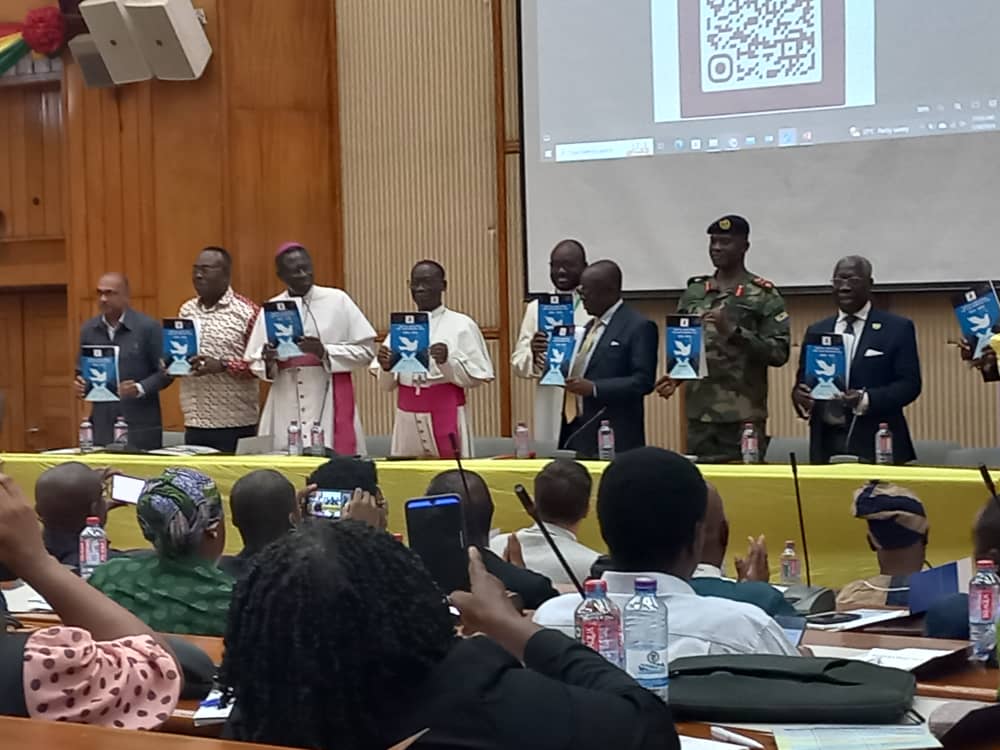By Hafsa Obeng
Accra, July 30, GNA – The Ghana Catholic Bishops Conference (GCPC), in conjunction with Catholic Relief Services (CRS), National Security, and the Ghana Journalist Association, launched the Sahel Peace Initiative, Ghana, in Accra on Tuesday.
The Initiative, which has a five-year strategic plan for peacebuilding, aims to promote unity, security, and peaceful elections in the subregion.
Speaking at the event, Mr. Albert Kan Dapaah, Minister of National Security, emphasized that all segments of society must play a role in preserving the country’s peace, given the severity of the recent terrorist attacks in the Sahel region.
He expressed concern about the ease with which terrorists had been able to move around the region, noting that Ghana remained vulnerable because of their attempts to expand their domains.
Mr. Kan-Dapaah said terrorists operating in the region were more interested in conquering the continent or capturing territory, and that “we have fallen to their activities because we did not build resilience in the past and do not have the resources to build the necessary resilience now.
“Related to these is the recent wave of democratic reprisals blown over the Sahel region. Concerns about the potency of democracy and the growing loss of confidence in democracy, contributes to the misunderstanding between government and the governed.”
Mr. Kan-Dapaah said Ghana continued to contend with electoral violence, which undermined the beauty of democracy.
“The electoral process leading to transitions have not been left without violence and this year’s elections will test the strength of our democracy.”
The Minister emphasized that the state alone could not guarantee a peaceful election.
He said promoting state stability required a multi-faceted approach to achieve it.
“We must be guarded by the fact that the actions and inactions of all parties can have far reaching implications on the peace of the country. Stakeholders must be active and ensure accountability remains part of our governance culture.”

Most Rev. Mathew Kwasi Gyamfi, President of the GCBC, said the Sahel region is currently battling many challenges that threaten the social fabric, as well as political tensions that undermine democratic process.
He said the SPI was created by the Catholic Bishops Conferences of Niger, Mali, Burkina Faso, Cote d’Ivoire, and Ghana, who decided to work together to promote peace, justice, and solidarity.
“It is our collective responsibility to address issues that threaten the sub-region with the urgency in demands. We must work together to create a community where everyone fills at ease and discuss strategies to strengthen our bond.”
Most Rev. Gyamfi said upcoming elections are a watershed moment in Ghana’s history and that “It is crucial that the elections are conducted with the highest standard of transparency and intelligence.”
“As stakeholders, we must ensure that everyone lives without fear and our public spaces remain safe for all, discourage any form of malpractice, safeguard the trust and ensure the elections are free from malpractice,” he stressed.
Mr. Daniel Mumuni, Country Representative, CRS, Ghana, noted that there were about 984 attacks in the Sahel region in the first quarter of this year, resulting in over 3240 deaths, a 130 percent increase over the previous year.
This crisis, he noted, was staggering and had been going on for ten years, prompting the need for the SPI, which is an ongoing process with a solid basis that allows for the creation of social cohesion and the development of long-term solutions to the issues at hand.
Mr. Mumuni stated that the initiative was built on seven pillars: to promote interreligious, intergenerational, and intercultural dialogue to foster tolerance and prevent tensions.
It aims to improve security and social cohesion through community engagement and international collaboration, and to strengthen humanitarian response and crisis management to build community resilience.
The initiative also aims to foster economic and social development through promoting inclusive growth and addressing inequalities, to promote environmental sustainability by integrating environmental considerations into security planning, to increase advocacy and awareness to counter extremist propaganda and raise public awareness, and to promote gender-related issues.
Mr. Mumuni said that the plan’s successful implementation would require collaborative efforts from stakeholders and resources and urged donor partners to not just mobilize resources but also consider how to manage them to achieve the desired goals.
“As we launch the SPI today, let us remember that it is not just a roadmap, but a shared vision that demands collective action and dedication.”
The launch was on the theme “Building a more peaceful and cohesive Ghana: A collective endeavor.”
GNA